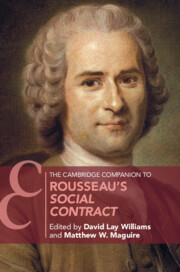Book contents
- The Cambridge Companion to Rousseau’s Social Contract
- Series page
- The Cambridge Companion to Rousseau’s Social Contract
- Copyright page
- Dedication
- Contents
- Contributors
- Acknowledgments
- 1 Introduction
- 2 “Every Legitimate Government Is Republican”
- 3 What If There Is No Legislator?
- 4 Rousseau’s Republican Citizenship
- 5 Rousseau’s Negative Liberty
- 6 Rousseau’s Ancient Ends of Legislation
- 7 Property and Possession in Rousseau’s Social Contract
- 8 Political Equality among Unequals
- 9 On the Primacy of Peoplehood
- 10 Rousseau on Voting and Electoral Laws
- 11 On the Possibility of a Modern Republic
- 12 Rousseau’s Case against Democracy
- 13 Rousseau’s Dilemma, or “Of Civil Religion”
- 14 Entreating the Political
- 15 Civil Religion and Political Unity
- Bibliography
- Index
- Series page
5 - Rousseau’s Negative Liberty
Themes of Domination and Skepticism in The Social Contract
Published online by Cambridge University Press: 28 March 2024
- The Cambridge Companion to Rousseau’s Social Contract
- Series page
- The Cambridge Companion to Rousseau’s Social Contract
- Copyright page
- Dedication
- Contents
- Contributors
- Acknowledgments
- 1 Introduction
- 2 “Every Legitimate Government Is Republican”
- 3 What If There Is No Legislator?
- 4 Rousseau’s Republican Citizenship
- 5 Rousseau’s Negative Liberty
- 6 Rousseau’s Ancient Ends of Legislation
- 7 Property and Possession in Rousseau’s Social Contract
- 8 Political Equality among Unequals
- 9 On the Primacy of Peoplehood
- 10 Rousseau on Voting and Electoral Laws
- 11 On the Possibility of a Modern Republic
- 12 Rousseau’s Case against Democracy
- 13 Rousseau’s Dilemma, or “Of Civil Religion”
- 14 Entreating the Political
- 15 Civil Religion and Political Unity
- Bibliography
- Index
- Series page
Summary
Rousseau’s Social Contract is often viewed as one of the early modern attempts to construct a theory of positive liberty. This interpretation makes sense. In Book I, Rousseau writes of freedom as a form of rational self-determination that enlarges and ennobles minds. Some theorists, most notably Isaiah Berlin, have argued that this notion of freedom opens the door to tyranny and blame Rousseau for the authoritarianism and fascism in the first half of the twentieth century. However, Rousseau is probably best considered a theorist of negative liberty. The Social Contract is in many respects a deeply practical work that primarily seeks to prevent both government and interpersonal domination and is animated by an underlying skepticism toward Rousseau’s very own solutions to these problems.
- Type
- Chapter
- Information
- The Cambridge Companion to Rousseau's Social Contract , pp. 88 - 112Publisher: Cambridge University PressPrint publication year: 2024

